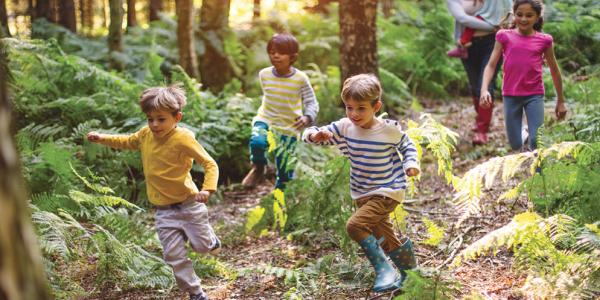Children in today’s world spend an average of seven hours a day in front of electronic devices, including the television, laptops, phones, and tablets. Over the years, outdoor play has been swapped with a more sedentary lifestyle, which has negative consequences for the overall development of children. Here are 6 important reasons for encouraging your kids to play outside.

1. Brain and Body Benefits
Sunlight, even on a cloudy day, provides a load of benefits. When children don’t get enough of it, early childhood learning opportunities are compromised. Here are a few of the benefits of sunlight on brain development:
- The brain’s inner clock is set according to the cues received from light patterns, so going outside can help kids to achieve and maintain a healthy pattern of sleep.
- Sunlight supplies vitamin D, which impacts early life brain development, bone growth, and muscle function.
- Bright light improves concentration and may help with forming brain synapses.
2. Eye Health Protection
Playing outdoors can provide a number of protective benefits for eye health. Multiple studies have shown that kids who play outside are less likely to develop myopia. One study that prescribed an extra 40 minutes of daily outdoor time to a randomized group of 6-year-olds found that they were less prone to the development of nearsightness during the next three years.
While researchers have not yet pegged the exact reason for the benefits of outside time on eyesight, there are a couple of possibilities. It could be that the time outdoors gives the eyes a break from focusing on close-up objects. Increased amounts of “close work,” like reading, can increase a child’s possibility of developing myopia. Another possibility is that the strong dosage of bright daylight is therapeutic and provides protective benefits.
3. Vocabulary Acquisition
Studies suggest that hands-on activities help young children to add new words to their vocabulary. Outdoor activity provides great chances for exploration that help kids to understand new concepts that they can physically see, hear, taste, smell, and touch. Playing outside is a prime opportunity for children to broaden their sensory experiences and acquire an intuitive understanding of new concepts and terminology.
4. Behavior Adjustments
As an adult, you probably can guess that people who connect with nature are better-adjusted and happier. This actually starts with young children. A recent study of preschoolers showed that children who spend a large part of their time outdoors are generally kind and unlikely to suffer emotional issues. Long-term exposure to natural settings may protect a child against developing behavior conditions such as hyperactivity, ADHD, or ADD.
5. Psychological Enhancements
Studies of children who grow up deprived of outside spaces show a 30% higher risk of substance abuse, mood disorders, and the development of stress-related or psychosomatic disorders. Time spent outdoors, particularly in natural, green spaces, can provide a number of psychological benefits, including the following:
- Nature walks can reduce distractibility, anxiety, and ADHD symptoms
- Lessons taught outside result in students becoming more motivated and self-directed
- Fresh air has shown to spark improvements in mood and provide benefits in reducing or recovering from stress
- Children become more focused and attentive following time spent outside
- Studies show that playing in green space improves children’s attention and working memory
6. Social Skills Improvement
The type of play that children engage in outside is just as important as whether they play indoors or out. Combining cooperative play with the great outdoors is one of the most beneficial opportunities for children. A study of 575 children aged 2-5 in Australia showed a link between outdoor play and development of social skills.
- Children who play outside showed greater cooperation, social expression, and verbalisation
- Children who play outdoors with older children who model good behaviour, such as taking turns and compromising, tend to internalise those skills.
- Kids who spend a great deal of time in green spaces are less stressed and more focused and cheerful, allowing them to communicate with peers and develop and maintain relationships with friends
Children today have a great deal of indoor distractions, but the importance of sending them outdoors to reap the benefits cannot be overstated. Fresh air, sunlight, and exposure to green spaces are critical for healthy development and early learning opportunities.
Leave a Reply